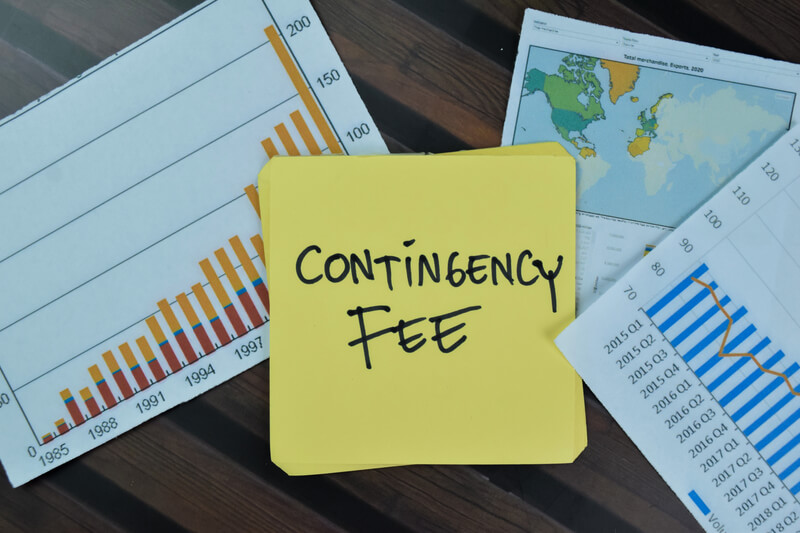The mere thought of high attorney fees can deter many individuals from seeking legal help. After all, if you get in an accident, how much will a lawyer cost. However, a solution exists in the form of a contingency fee arrangement. This payment structure makes justice more attainable by enabling individuals to access legal services without prohibitive costs.
This article explores the concept of a contingency fee in detail. We will examine its definition, how it works, and it’s typical usage. As a result, you will have substantial insights into the advantages and disadvantages.
You should have the same opportunity as anyone else to decide if this fee structure works for you. So, get started by diving into this crucial aspect of legal representation.
Contingency Fee Essentials
A contingency fee is a payment arrangement where attorney fees depend on success. Consequently, the firm agrees to represent you and handle your legal matter without upfront payments. Instead, the attorney receives a percentage of the financial recovery or settlement.
If the case is unsuccessful, the attorney does not receive a fee. Nonetheless, you may still be responsible for some out-of-pocket expenses.
How It Works
There must be a written agreement to agree to a contingency fee. It will specify the percentage and other critical details.
Jurisdictions often allow anywhere from 30% to 40%, depending on the complexity. If applicable, the documentation should also include detail about any expenses, such as court filings.
The attorney will work on your behalf by conducting investigations, gathering evidence, and negotiating. If necessary, they will take the case to trial.
Typical Usage
A significant portion of personal injury cases operates on a contingency basis. This litigation may include car accidents, slip and fall incidents, or defective product claims.
You may not have the financial means to pay for a lawyer when an accident happens. Therefore, you can align your interests with your attorney and have confidence knowing they must work diligently. But, is a contingency fee cheaper than other ways to pay a lawyer.
Advantages of Contingency Fees
In traditional billing models, especially with businesses, clients pay a retainer to secure legal representation. This obligation can pose a significant burden. But a contingency fee allows you to gain access to legal services without worrying about substantial bills.
Lawyers are highly motivated to win the case for their clients. They have a transparent interest in devoting their time, expertise, and resources to a favorable result.
Also, hourly billing rates for attorneys can be prohibitively expensive. This challenge is especially notable in complex legal matters that require extensive effort. A contingency fee levels the playing field and allows those with limited financial means to access the civil justice system.
Disadvantages of Contingency Fees
You may pay more than if you hired an attorney who works hourly. Accordingly, you should examine other fee structures before blindly entering this agreement.
Lawyers that work on contingency can also be more selective in the cases they choose. This potential dynamic means clients with more challenging situations may have difficulty finding representation.
Finally, there can be a conflict of interest between the attorney and the client regarding the desired outcome. You may want to focus on getting the highest possible recovery amount. Meanwhile, your lawyer may want to go with a quick settlement.
Have an open and honest understanding with your attorney to ensure your goals are the same. Everyone deserves to pursue the best possible outcome without letting other factors get in the way.
How to Negotiate a Contingency Fee Agreement
There can be state laws that dictate the exact amount an attorney can charge on contingency. However, you may have room to negotiate. A quick search of the laws in your jurisdiction will help you understand your options.
Additionally, talk with your attorney about any additional costs or billing. These expenses often include filing fees, expert witness fees, or deposition expenses.
Generally, the fee payment happens after the case. You receive your damages or settlement minus what you owe your legal counsel. Regardless, it is also worth noting that you can recover expenses as part of the court’s ruling.
Common Misconceptions About Contingency Fees
Contingency fees can be a source of profound misunderstandings for many people. For example, you may have heard someone say that expenses are always unfair. But the reality is that firms must dedicate valuable services, time, and expertise. Their bottom line is not as abundant as others may believe by the time the funds settle.
You may also find comfort in knowing that contingency fees come with strict regulations and ethical rules. For instance, some jurisdictions may have specific caps on the percentage.
Talk to a Local Attorney About Their Contingency Fee
Are you ready to level the playing field and gain access to a skilled attorney?
A contingency fee arrangement may be crucial to getting the help you deserve. So, if you find yourself in need of legal assistance, don’t hesitate to contact us. We can connect you to a local attorney that can help you take action immediately.
Don’t allow your fears about attorney costs to fuel your procrastination. Take the first step today by contacting us online or calling (866) 345-6784!

